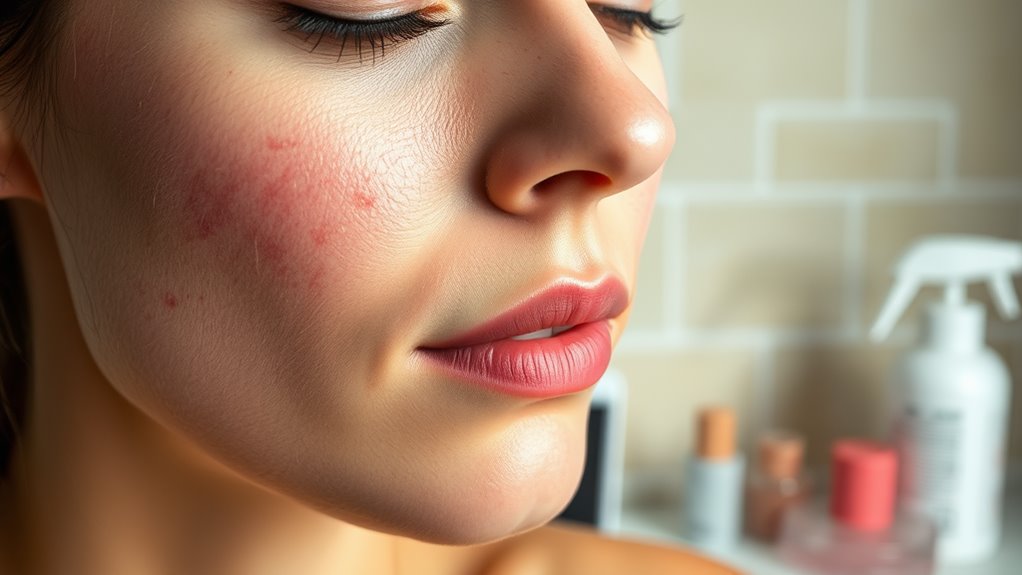Warning! These 5 Everyday Habits Are Causing Your Skin Irritation!
You might not realize it, but five everyday habits could be causing your skin irritation. Overusing skincare products can overwhelm your skin’s barrier, while neglecting sun protection leads to redness and accelerated aging. Poor dietary choices, like high sugar intake, can trigger inflammation. Inadequate hygiene practices invite bacteria, and stress paired with lack of sleep hinders your skin’s ability to repair. If you’re curious about how to break these habits, stick around for more insight.
Overusing Skincare Products
Many people don’t realize that overusing skincare products can lead to irritation and breakouts. When you layer too many creams, serums, or treatments, your skin can become overwhelmed. This over-application can strip your skin’s natural barrier, exposing it to hidden skin irritation causes like redness and dryness.
Instead of achieving that flawless complexion, you may find yourself battling unwanted reactions.
To master your skincare routine, simplify it. Focus on a few high-quality products tailored to your skin type. Pay attention to how your skin responds; it’s essential to listen to its needs.
Neglecting Sun Protection
Even if you diligently follow a skincare routine, neglecting sun protection can lead to serious skin irritation and damage.
UV rays can wreak havoc on your skin, causing redness, irritation, and premature aging. To master your sun protection game, keep these four key practices in mind:
-
Apply Broad-Spectrum SPF: Use a broad-spectrum sunscreen with at least SPF 30 daily, even on cloudy days.
-
Reapply Regularly: Reapply every two hours, or more often if you’re sweating or swimming.
-
Seek Shade: Whenever possible, stay in the shade, especially during peak sun hours (10 a.m. to 4 p.m.).
-
Wear Protective Clothing: Opt for long sleeves, hats, and UV-blocking sunglasses to shield your skin effectively.
Master these habits, and your skin will thank you!
Poor Dietary Choices
While you mightn’t realize it, poor dietary choices can significantly impact your skin’s health and lead to irritation. High sugar intake, for example, spikes insulin levels, triggering inflammation that manifests as breakouts or redness.
Processed foods often contain unhealthy fats and additives that compromise skin integrity, making it more prone to irritation. Additionally, a lack of essential nutrients, like vitamins A, C, and E, can weaken your skin’s barrier function, leaving it vulnerable.
Staying hydrated is equally crucial; dehydration can make your skin appear dull and exacerbate existing issues. By prioritizing whole foods rich in antioxidants and healthy fats, you can nourish your skin from within, promoting a clearer and more resilient complexion.
Choose wisely for lasting skin health.
Inadequate Hygiene Practices
In addition to poor dietary choices, inadequate hygiene practices can lead to significant skin irritation.
You mightn’t realize how simple habits can impact your skin’s health. Here are four hygiene practices to refine:
-
Daily Cleansing: Wash your face and body daily to remove dirt, oil, and bacteria.
-
Clean Towels and Bedding: Regularly change and wash your towels and sheets to eliminate irritants.
-
Moisturize Regularly: Apply a suitable moisturizer after cleansing to maintain your skin’s barrier.
-
Avoid Touching Your Face: Keep your hands away from your face to prevent transferring oils and germs.
Stress and Lack of Sleep
Stress and lack of sleep can wreak havoc on your skin, leading to irritation and breakouts. When you’re stressed, your body produces cortisol, which can increase oil production and trigger inflammation. This often results in acne or exacerbates existing skin conditions.
Additionally, insufficient sleep impairs your skin’s ability to repair itself, making it more susceptible to irritation.
To combat this, prioritize stress management techniques like meditation or exercise, and establish a consistent sleep schedule. Aim for at least seven to eight hours of quality sleep each night.
Frequently Asked Questions
Can Environmental Factors Also Contribute to Skin Irritation?
Absolutely, environmental factors like pollution, humidity, and temperature changes can irritate your skin. You should pay attention to these elements, as they can trigger reactions or exacerbate existing skin conditions you might have.
How Can I Identify My Skin Type?
To identify your skin type, cleanse your face and observe how it feels after an hour. If it’s oily, dry, or balanced, you’ll know which products suit you best for optimal care.
Are There Specific Allergens to Watch for in Skincare?
Yes, you should watch for allergens like fragrances, parabens, sulfates, and certain preservatives in skincare products. Reading ingredient labels carefully can help you avoid reactions and keep your skin healthy and irritation-free.
What Are the Best Fabrics for Sensitive Skin?
For sensitive skin, choose natural fabrics like cotton, silk, or bamboo. These materials breathe well and minimize irritation. Avoid synthetics and rough textures, as they may exacerbate discomfort and lead to unwanted reactions.
How Often Should I Change My Pillowcase?
You should change your pillowcase at least once a week. If you have sensitive skin, consider doing it every few days. This helps remove dirt, oil, and allergens that can irritate your skin while you sleep.

